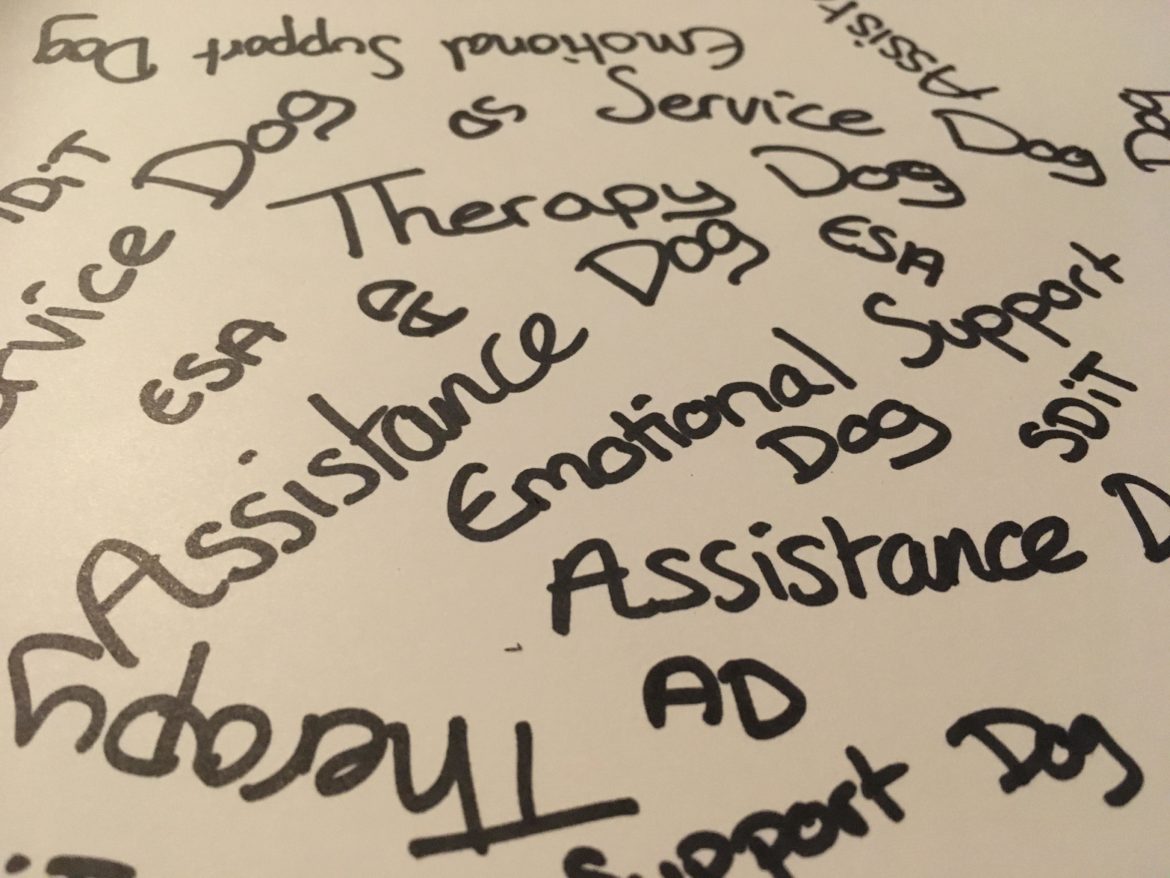Why the Title DOES Matter!
DISCUSSION ABOUT THE SIGNIFICANCE OF HOW YOU LABEL AN ASSISTANCE DOG
Author: Elmiri Fox
I’ve been hearing “The title doesn’t matter” a lot in the Assistance Dog community lately, and it’s honestly driving me mad. The title discussed here refers to the label we give to dogs acting as auxiliary aids for disabled handlers – largely agreed to be ‘Assistance Dog’ and ‘Assistance Dog in training’ (this is including all the other recognised sub titles like guide dog, hearing dog, alert dog and more).
Recently there has been a lot of discussion about it not being significant, with the theory behind it supposedly being based on the way the law is written in the UK. Me? Well I disagree with this theory.
The law doesn’t define the difference between civil police, military police, body guards, security guards or palace guards. But there is most definitely a difference! How do we and the law distinguish this difference? By the title we give them.
Military police have no jurisdiction outside of military affairs, they can not just pull someone over for speeding in public, it would be illegal for them to do so. In the same sense, civil police can not go into military bases without prior consent.
Comparing the titles between police, guards etc with titling an assistance dog may be extreme but the comparison is only presented on a title sense, not the degree to which you can be prosecuted for misrepresentation.
So why is this saying “the title doesn’t matter” going around so much?
We’ve all heard it said before, how someone has an ESA (Emotional Support Animal) or a therapy dog for their mental health in the UK.
Well going by the ONLY definition of an ESA, they are not something we have in the UK by UK law. ‘Therapy dogs’ are also the title given to dogs that have no legal rights as presented by UK law. They have no direct access rights to hospitals or schools etc. Instead, they are actually invited there by the premises through an organisation and the dogs assist other people, not the handler.
The title ‘assistance dog’ is actually mentioned in UK law. It may only be in regards to taxi and private hire access but it is mentioned.
Labelling a dog which is actually an assistance dog as either an ESA or therapy animal is confusing and misleading. The same can be said for when you label a therapy animal or ESA as an assistance dog. Doing either of these could instantly discredit the handler/owner if they went to court over an issue.
There has also been an increase in the belief that an assistance dog for mental health is called an ESA. This is incorrect. An assistance dog for mental health is an assistance dog, they can label it directly after the persons condition or as a ‘psychiatric assistance dog’ if they wish, but it’s still an assistance dog. Similarly, a guide dog is just a type of assistance dog.
It’s truly not that difficult to label a dog correctly.
ESA and therapy dog titles for what is actually an assistance dog or an assistance dog in training are major no-nos in the community, and for good reason. At the end of the day it will only lead others believing the dog is a fake, a pet and more than likely lead to bullying. Mislabelling a dog is usually a lack of education which is why people believe its a fake. If the handler is unaware of what an assistance dog, therapy animal, or ESA actually is, how can they claim to have one with access rights?
An assistance dog may be an auxiliary aid, but so is a wheelchair, walker, walking stick, crutches, hearing aid, or white cane. We don’t go around saying our wheelchair is an auxiliary aid in everyday life, in the same manner I don’t go around saying my assistance dog an auxiliary aid. This is outside of access issues where a further explanation is needed, which happens with ANY auxiliary aid user, all of whom call their items what they are. It is no different with a dog, there is no need to misrepresent or mislabel one. And just in case you weren’t sure, there is DEFINITELY no need to label a pet dog as an ESA, therapy dog or assistance dog. Ever.





